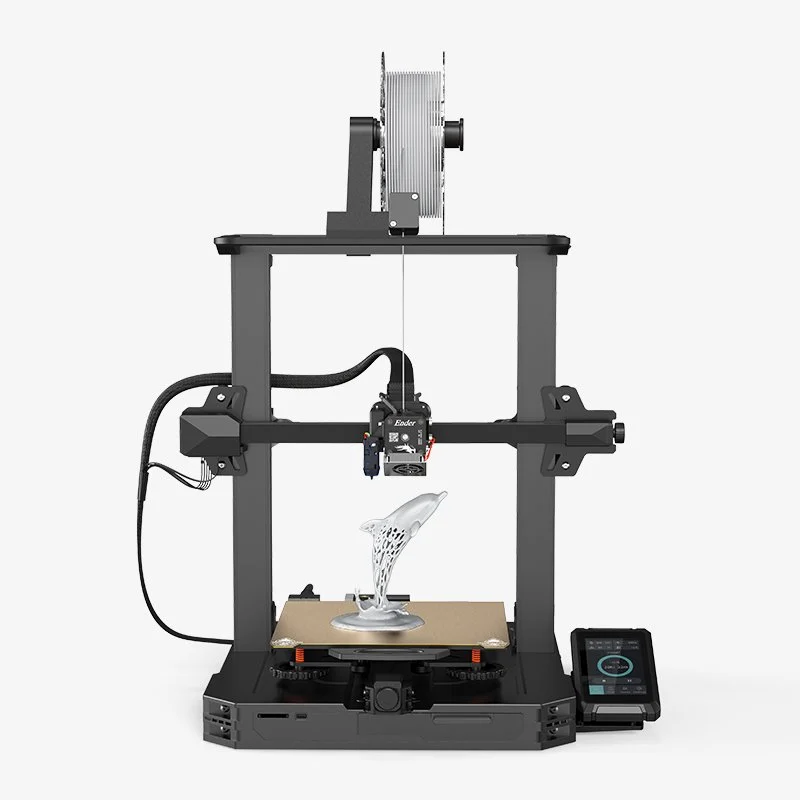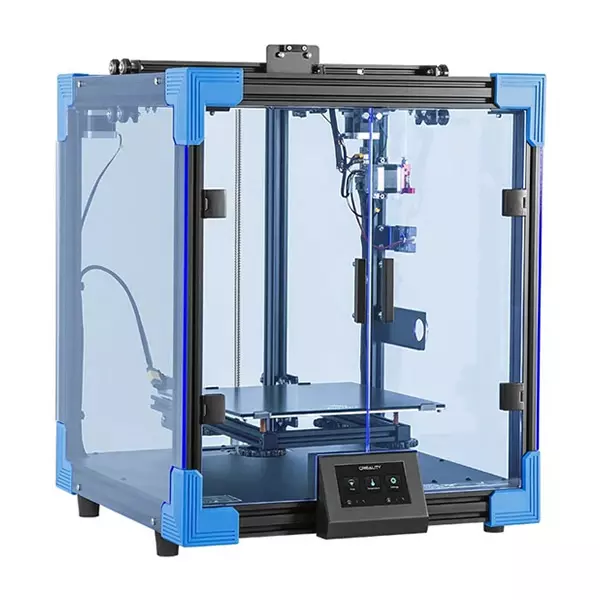Compare Ender 3 S1 PRO vs Ender 6
Comparison between the best 3D printers
Choose the best 3D printer at the best price. The cheapest 3D printers are here.
Buy a 3D printer here with 3D Fila.
 |
 |
|
| Model | Ender 3 S1 PRO[BUY Ender 3 S1 PRO] |
Ender 6[BUY Ender 6] |
| Printing Material | Filament | Filament |
| Buy Filament for Creality 3D Ender 3 S1 PRO | Buy Filament forCreality 3D Ender 6 | |
| Estimated price | $499,00 | $499,00 |
| Manufacturer | Creality 3D | Creality 3D |
| Release Year | 2022 | 2020 |
| Print Volume [mm] | 220x220x270 | 250x250x400 |
| Printer Size [mm] | 450x49x620 | 495x495x650 |
| Weight [kg] | 8,7kg | 22 |
| Power Loss Recovery | YES | YES |
| Enclosed printer | NO | YES |
| Bed Leveling | Automatic | Manual |
| Filament End Sensor | YES | YES |
| Bed type | Heated | Heated |
| Power supply system | Direct Drive | Bowden |
| Standard nozzle | 0,4 | 0,4 |
| Maximum Nozzle Temperature [°C] | 300 | 260 |
| Maximum Bed Temperature [°C] | 110 | 100 |
| Maximum printing speed [mm/s] | 150 | 150 |
| Filament holder | YES | YES |
| Camera for supervision | NO | NO |
| Recommended filaments | PLA, PETG | PLA, TPU, ABS, PETG |
| Recommended slicers | Cura, Simplify, Slic3r | Cura, Simplify, Slic3r |
| Maximum Resolution [mm] | 0,1 | 0,1 |
| Processor | 32 bits | |
| Display | Display touchscreen 4,3'' | Touchscreen TFT 4,3'' |
| Power Supply | 350 | 24V / 504W |
| Connectivity | SD | SD / USB |
| Operating systems | Windows, Mac, Linux | Windows, Mac, Linux |
| Date of registration in the system | 2022-10-11 | 2021-04-15 |
| Release date | 2022 | 2020 |
| Extra features | Creality's Ender 3 S1 PRO is an innovation in the Ender 3 series, featuring a Sprite Pro Extruder capable of reaching 300°C and dual lead screws on the Z axis, ensuring greater stability and print quality. Its PEI-coated print bed, combined with CR-Touch automatic leveling, provides excellent adhesion and ease of part removal. The user interface, via a 4.3-inch touchscreen, offers intuitive and efficient control, although it has some limitations regarding the handling of long file names and navigation. The well-designed extruder ensures effective cooling and handling of various filaments, although there may be a slight ghosting effect at high speeds due to its weight. This printer represents a balance between technological advances and operational challenges, remaining faithful to the quality expected of the Ender line. | The Creality Ender 6 stands out in the world of 3D printers with its CoreXY system, offering fast and high-quality prints. With a robust design, it has acrylic panels to protect against air currents, optimizing the printing of materials that require higher temperatures. It features a generic Creality hotend, effective up to ~240°C. Its differentials include 10mm GATES belts, promoting stability at high speeds, and a 360W power supply for reliable performance. The machine also has an intuitive user interface through a 4.3-inch touchscreen. |
| Support for multiple colors and materials (AMS and CFS) | NO | NO |
Notes * |
||
| Cost-benefit | 7 / 10 | 7 / 10 |
| Hardware | 2.8 / 10 | 2.5 / 10 |
| Tela | . | . |
| Print volume | 3 / 10 | 4 / 10 |
| Performance | 1 / 10 | 1 / 10 |
| [BUY Ender 3 S1 PRO] | [BUY Ender 6] |
Conclusion |
| In comparing the Ender 3 S1 PRO and the Ender 6, both printers provide significant value at a similar price point, yet they cater to different user needs and preferences in the 3D printing landscape. The Ender 3 S1 PRO, released in 2022, is designed for hobbyists and enthusiasts who prioritize ease of use and a compact form factor. It features automatic bed leveling, a direct drive system for improved filament handling, and a maximum nozzle temperature of 300°C, making it suitable for a wider range of materials. Its smaller print volume, while limiting for larger projects, is conducive for detailed work and allows for a more manageable workspace. The ergonomics of its touchscreen interface add to the user experience, although it has some limitations. Conversely, the Ender 6, introduced in 2020, is tailored for users demanding larger print volumes and versatility in material usage. The enclosed design offers better temperature stability, which is essential for high-temperature materials like ABS and TPU. Although it employs manual bed leveling and a Bowden extruder, which may pose challenges for novice users, its CoreXY architecture contributes to faster print speeds and potentially higher print quality. The printer's robust build is complemented by a larger power supply, supporting its performance under demanding conditions. Ultimately, the choice between these two models hinges on the user's specific requirements. The Ender 3 S1 PRO excels in ease of use and versatility for various filaments, making it ideal for beginners or users focused on precision. On the other hand, the Ender 6 appeals to those who need a larger build volume and better insulation for high-temperature materials, suited for advanced projects. Both printers offer solid performance, but the right selection will depend on the user’s printing goals and experience level. |

